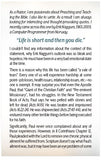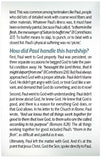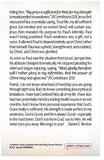How To Handle Hardship
Special-Order Folded Tract
 NOTE: This item is custom-printed to order (click for more details).
NOTE: This item is custom-printed to order (click for more details).
This tract is from our print-on-demand library, and is not kept in stock. Select the options below, and we will custom-print a batch just for you. Because this item is custom-printed, you can add your custom imprint to the back page at no extra cost.
- Estimated shipping date: Monday, December 1 (Click for more details)
- SKU:
- Discounts: Discount coupons do not apply to this item
- Format: Folded Tract
- Size: 3.5 inches x 5.5 inches
- Pages: 4
- Imprinting: Available with 2 lines of custom text
- Version: KJV
- Returns: Because this item is custom-printed to order, it cannot be returned.
Show all item details
The full text of this tract is shown below in the KJV version. (Do you want to print this tract in a different version than the one listed? Contact us and let us know what you're looking for—we may be able to create the alternate version for you at no charge.)
As a Pastor, I am passionate about Preaching and Teaching the Bible. I also like to write. As a result I am always looking for interesting and thought-provoking quotes. I recently came across this one by Erik Naggum, 1965-2009, a Computer Programmer from Norway:
“Life is short and then you die.”
I couldn’t find any information about the context of this statement, why Erik Naggum’s outlook was so bleak and hopeless. He must have been in a very bad emotional state at the time.
There is a reason why this life has been called “a vale of tears”. Every one of us will experience hardship at some point—job losses, health issues, relationship issues, etc.—no one is exempt. It may surprise you that even the Apostle Paul, that “Giant of the Christian Faith” and “Pre-eminent Missionary”, had his struggles. In the New Testament Book of Acts, Paul says he was pelted with stones and left for dead (Acts 14:19). He was beaten and imprisoned (Acts 16:22-24). He was shipwrecked (Acts 27:43-44), and he endured many other terrible things before being executed for his faith.
Significantly, Paul never once complained about any of those experiences. However, in II Corinthians Chapter 12, Paul pleaded with the Lord to remove one chronic physical ailment he suffered from. Scripture doesn’t say what Paul’s ailment was, but it may have been an eye problem of some kind. This was common among tentmakers like Paul, people who did lots of detailed work with coarse wool fibers and other materials. Whatever Paul’s illness was, it must have been extremely painful, because Paul calls it, “a thorn in the flesh, the messenger of Satan to buffet me” (II Corinthians 12:7). To buffet means to slap, to punch, or to beat with a closed fist. Paul’s physical suffering was no ‘picnic’.
How did Paul handle this hardship?
First, Paul went to God properly. Paul was persistent, on three separate occasions he begged God to take the painful condition away. He “besought the Lord thrice, that it might depart from me” (II Corinthians 12:8). But Paul always approached God with a proper attitude. Paul didn’t blame God. He didn’t get angry with God, or treat God like a servant, and demand that God do something, and do it now!
Second, Paul went to God with understanding. Paul didn’t just know about God, he knew God. He knew that God is good, and there is a reason for everything God does, or that God allows. In his letter to the Church in Rome, Paul wrote, “And we know that all things work together for good to them that love God, to them who are the called according to his purpose” (Romans 8:28). The all things working together for good included Paul’s “thorn in the flesh”, as difficult and painful as it was.
Ultimately, Paul left the matter with God. And it’s at this point that Jesus Christ, God the Son, spoke directly to Paul, telling him, “My grace is sufficient for thee: for my strength is made perfect in weakness” (II Corinthians 12:9). Jesus first reassured Paul, essentially saying, Trust Me, my all-sufficient grace [un-merited and un-earned favor] will sustain you. Jesus then revealed His purpose for Paul’s infirmity. Paul wasn’t being punished. Paul’s weakness was a gift, not a curse. It allowed Paul to depend entirely upon Christ rather than himself. Paul was upheld, strengthened, and enabled, by Christ, and Christ was glorified.
As soon as Paul saw the situation from Jesus’ perspective, his attitude changed dramatically. He stopped pleading for relief and began rejoicing, saying, “Most gladly therefore will I rather glory in my infirmities, that the power of Christ may rest upon me” (II Corinthians 12:9).
Friend, I do not know what kind of hardship you are going through right now. But I do know something about physical limitations. I have had Cerebral Palsy all of my life. I have also had two potentially ministry-ending health issues in recent months. And I know from personal experience that God’s Grace really is sufficient, His strength is made perfect in my weakness. God is Good, and He is always Good—especially in the hard times. Don’t run from God, run to Him. He will never turn you away. Blessings to you! - Daniel E. Benton











